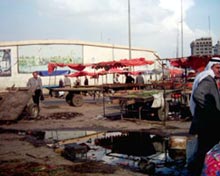|
Mosul
Offensive Looms Large
 |
|
A herd of sheep approaches US Army soldiers at a checkpoint on the outskirts of Mosul
|
Additional
Reporting By Saleh Amer, IOL Correspondent
MOSUL,
November 22 (IslamOnline.net & News Agencies) – Iraq’s
ethnically diverse northern city of Mosul is bracing for a full-scale
offensive as the US-led occupation troops seem poised to replicate the
onslaught on war-battered Fallujah.
Despite
the relatively tranquil atmosphere prevailing in the city following
days of fierce clashes culminating in the killing of nine Iraqi
troops, many Mosul residents believe that it is only a lull before
another storm.
People
were scared off by fear and panic from schools and places of work
despite reassuring calls from Iraqi officials.
The
US-backed Iraqi troops have recently stepped up attacks against
resistance targets in Mosul after the city had slipped out of control.
Parts
of Mosul were set ablaze last week when unknown people ransacked and
torched about 10 police stations in coordinated attacks, panicking
police who abandoned their posts.
They
are now sure of only one thing that a bloody attack is looming large
specially after Gen. Foliyah Rashid, the commander of a special force
called in from Baghdad last week to control the city, asserted the
imminent attack was aimed at flushing out resistance pockets.
Ghost
Town
 |
|
The city’s markets looked deserted due to the prevailing sense of insecurity
|
“Many
pupils have been absent from school over the past few days,” Ibtsam
Abdullah, an English teacher in a single-sex school, told
IslamOnline.net.
“My
colleagues and I really consider absenting ourselves from work as the
worst is yet to come,” she added while erasing present tense rules
from the blackboard.
Mostafa
Hassan, a fourth-grade student, also went to his nearby 600-strong
school to only find 15 students.
The
usually bursting-at-the-seams markets of Mosul are mostly closed as
the city seemed to be a ghost town.
Salesmen
limited their working hours to only three from 11:00 a.m. to 01:00
p.m.
“People
can’t take the risk of crossing the bridge linking the eastern and
western parts of Mosul on the Tigris, since it can be closed by US
forces at anytime,” said Moaz Ahmed, who owns a textile store in the
onetime bustling Al-Maash market.
With
the market in the eastern part now looking deserted, merchants and
farmers took their commodities and crops on mobile carriages to make a
living.
“Now
I feel like a real drudge as I have to go all the way to the western
part of the city every day,” said Abu Abdul Rahman, who was busy
arranging vegetables on his hoary cart.
The
specter of the offensive cost butcher Salem Ali dearly as many of his
slaughtered sheep remained unsold given that he cannot afford renting
a car to take them to the western part.
Alarmed
Arab
people here are further alarmed as the US occupation troops are
turning to their old allies, the Kurds, to tighten the grip on Mosul.
A
battalion of Iraq's paramilitary National Guard has been sent in from
the Kurdish cities of Arbil and Dohuk and another could soon join
them, raising the total to around 1,800 men, Reuters news agency
reported.
While
now in National Guard uniform and answerable to the Iraqi Defense
Ministry in Baghdad, most of the Kurds were until recently
“peshmerga” fighters, a well-organized and feared force set up by
Kurdish leaders in the mountains who, with US help, fought Saddam
Hussein's army to a standstill after the Gulf War.
Their
deployment has provoked consternation among Arab residents who fear
that the Kurds, who want a fully independent state in northern Iraq,
are trying to expand their territory onto the oil-rich plain to the
south of their strongholds.
“Nobody
wants the Kurdish army here,” said Abeet Ranam, 40, an Arab
storeowner in an upscale neighborhood of northeastern Mosul.
“There
have been Kurds living here for centuries and that is fine. But we do
not want the Kurdish army.”
In
the west of the city on Sunday, a Reuters reporter saw the bodies of
three National Guards. A note by the bodies read: “These are
peshmerga soldiers”.
Some
10,000 US marines and army forces, alongside some 2,000 Iraqi national
guard soldiers unleashed
a long expected onslaught on the resistance hub
of Fallujah on
November 8, capping long nights of massive US raids.
The
successive raids have caused massive damage in the city, with dead
bodies still littering the streets.
|